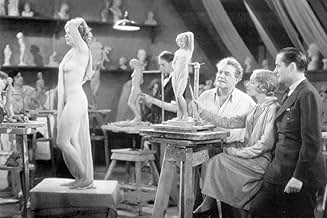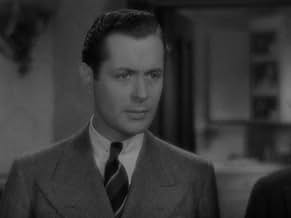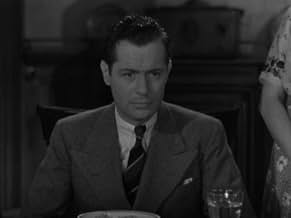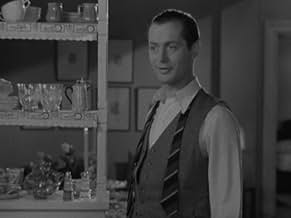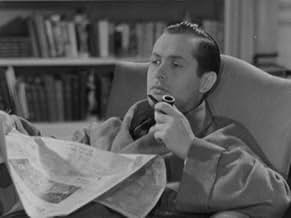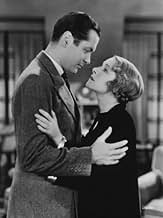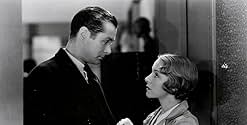A new bride learns she and her husband's stuck-up family don't speak the same language.A new bride learns she and her husband's stuck-up family don't speak the same language.A new bride learns she and her husband's stuck-up family don't speak the same language.
- Awards
- 3 wins total
Julia Bejarano
- Umbrella Peddler
- (uncredited)
William Farnum
- C. Forrester
- (uncredited)
Sherry Hall
- Purser
- (uncredited)
Featured reviews
ANOTHER LANGUAGE is the story of a marriage that suffers because the husband (ROBERT MONTGOMERY) is a self-centered snob ruled by a family that views its mother (LOUISE CLOSSER HALE) as the matriarch of the family who must be paid attention at all costs and smothers Montgomery with motherly affection. I loved the line spoken by HENRY TRAVERS, who tells her at a crucial moment, "Shut up, ma and don't faint. He's not looking."
HELEN HAYES gives one of her more natural performances on film. Very often she was prone to stage acting techniques, but here her manner is subdued and never overplayed. Montgomery is excellent and makes the man a weakling the viewer can never really warm up to until the final moments when he stands by her side.
Rose Franken was an expert at telling stories about family relationships, as she did with "Claudia" and the sequel "Claudia and David". Here she paints a vivid portrait of unpleasant family relationships.
In strong supporting roles, MARGARET HAMILTON and JOHN BEAL repeat their stage roles effectively.
HELEN HAYES gives one of her more natural performances on film. Very often she was prone to stage acting techniques, but here her manner is subdued and never overplayed. Montgomery is excellent and makes the man a weakling the viewer can never really warm up to until the final moments when he stands by her side.
Rose Franken was an expert at telling stories about family relationships, as she did with "Claudia" and the sequel "Claudia and David". Here she paints a vivid portrait of unpleasant family relationships.
In strong supporting roles, MARGARET HAMILTON and JOHN BEAL repeat their stage roles effectively.
Anyone interested in family relationships will surely enjoy this movie about a manipulative matriarch, Louise Closser Hale, who is not averse to fake fainting spells to get her way with her four sons and their wives. The acting is first-rate by a stellar cast, five of whom (John Beal, Hal K. Dawson, Irene Cattell, Maidel Turner and Margaret Hamilton) were in the original Broadway production which opened 25 April 1932, and who reprised their roles. This was also the film debut of Beal, Hamilton and Cattell (the only film she ever made). But kudos go to the magnificent Helen Hayes as the new addition to the family who stands up to Hale, John Beal, as her sensitive nephew who falls in love with her, and Robert Montgomery playing Hayes' husband, still under the control of his mother. I thoroughly enjoyed this movie. Stick with it until the end; the last 20 minutes are as riveting as any drama can be.
A young couple who've eloped (Robert Montgomery and Helen Hayes) return to New York and begin spending time with his family - his parents, two brothers and their wives, and his nephew. It slowly turns into a nightmare for her, because the mother is manipulative of her son, the sisters-in-law mix in cutting remarks with their pleasantries, and one of the brothers-in-law is an immature bore (one of the things he does is surprise women by running his hand along their back and making a slide whistle sound).
Her marriage begins to deteriorate because her husband sides with his family in their assessment that she's "high hatting" them. While it's true that she's more worldly and refined, she doesn't look down her nose at them at all, and in reality suffers from their barbs at the weekly get togethers. Enter the nephew (John Beal), who is also a bit of an outcast in the family, because he's interested in things like architecture and travel. He soon develops feelings for his aunt that go beyond normal affection, but despite her own unhappiness, she reminds him of how inappropriate it is.
You might divine that this is a pre-Code film because it deals with the incestual love a nephew has for his aunt, which, even if it isn't by blood, is obviously a taboo subject, or maybe because of a scene with a female model in the background of a sculpting class draped with thin sheer fabric. Despite how salacious it sounds (or how production stills show the model from the side, close-up and almost entirely nude), it feels pre-Code mostly because of how honest it is. There is such a realistic portrayal of the family's passive aggressiveness here that it's very frustrating and claustrophobic, and the script has a tight, very modern feel to it, particularly in the ensemble scenes.
I love Margaret Hamilton in this as one of the sister-in-laws, and Helen Hayes is as radiant as ever. Louise Closser Hale is great as the mother too, even if the character is irritating, and it's notable that it was her last film, as she would die at 60 two days before the film was released. It zips along at 77 minutes, never lagging, and while I wish it had ended a little differently, it made for a satisfying watch.
Her marriage begins to deteriorate because her husband sides with his family in their assessment that she's "high hatting" them. While it's true that she's more worldly and refined, she doesn't look down her nose at them at all, and in reality suffers from their barbs at the weekly get togethers. Enter the nephew (John Beal), who is also a bit of an outcast in the family, because he's interested in things like architecture and travel. He soon develops feelings for his aunt that go beyond normal affection, but despite her own unhappiness, she reminds him of how inappropriate it is.
You might divine that this is a pre-Code film because it deals with the incestual love a nephew has for his aunt, which, even if it isn't by blood, is obviously a taboo subject, or maybe because of a scene with a female model in the background of a sculpting class draped with thin sheer fabric. Despite how salacious it sounds (or how production stills show the model from the side, close-up and almost entirely nude), it feels pre-Code mostly because of how honest it is. There is such a realistic portrayal of the family's passive aggressiveness here that it's very frustrating and claustrophobic, and the script has a tight, very modern feel to it, particularly in the ensemble scenes.
I love Margaret Hamilton in this as one of the sister-in-laws, and Helen Hayes is as radiant as ever. Louise Closser Hale is great as the mother too, even if the character is irritating, and it's notable that it was her last film, as she would die at 60 two days before the film was released. It zips along at 77 minutes, never lagging, and while I wish it had ended a little differently, it made for a satisfying watch.
A marvelous movie, from start to (just before the) finish.
We meet Robert Montgomery and Helen Hayes, with whom he has eloped recently, on shipboard. She is eager to start their home life together. All he can think of is seeing his mother.
Louise Closser Hale is superb as the suffocating matriarch of his family. The other members, including Henry Travers and Margaret Hamilton, are very good as well. Especially fine is John Beal, as Montgomery's nephew. Indeed, he gives a heart-wrenching performance. It's possibly the best in this movie and he is working against very stiff competition.
Montgomery is not only a mama's boy -- called Vicky by everyone, as his name is Victor. He is also a supreme narcissist: In one shocking scene, he inspects himself in a mirror over the mantel. Directly under the mirror is a plaster bust of him that Hayes has lovingly worked on sculpting. He doesn't even notice it.
It's very hard to fault this movie. The ending is a trifle disappointing. And a Mark Twain aphorism is spoken by one character and laughed at by others, as if it were original to this screenplay.
Hayes is superb and very likable. Montgomery, not generally a favorite of mine, is believable as her self-centered husband. Beal is absolutely superb in a very touching role. And Hale is subtle but compelling as the woman of iron who becomes an invalid the minute doing so will get what she wants from her offspring.
We meet Robert Montgomery and Helen Hayes, with whom he has eloped recently, on shipboard. She is eager to start their home life together. All he can think of is seeing his mother.
Louise Closser Hale is superb as the suffocating matriarch of his family. The other members, including Henry Travers and Margaret Hamilton, are very good as well. Especially fine is John Beal, as Montgomery's nephew. Indeed, he gives a heart-wrenching performance. It's possibly the best in this movie and he is working against very stiff competition.
Montgomery is not only a mama's boy -- called Vicky by everyone, as his name is Victor. He is also a supreme narcissist: In one shocking scene, he inspects himself in a mirror over the mantel. Directly under the mirror is a plaster bust of him that Hayes has lovingly worked on sculpting. He doesn't even notice it.
It's very hard to fault this movie. The ending is a trifle disappointing. And a Mark Twain aphorism is spoken by one character and laughed at by others, as if it were original to this screenplay.
Hayes is superb and very likable. Montgomery, not generally a favorite of mine, is believable as her self-centered husband. Beal is absolutely superb in a very touching role. And Hale is subtle but compelling as the woman of iron who becomes an invalid the minute doing so will get what she wants from her offspring.
"Another Language" works because the whole is greater than the sum of its parts - and that is not meant to insult the parts. Robert Montgomery plays multiple roles, and he plays them all well: sometimes a genuinely caring husband, sometimes a stand-offish snob, and sometimes a superior bully. It's as if he was doing a greatest hits part.
It is Helen Hayes, however, in one her rare film appearances, who shines out a little more than everyone else. She was really a fine actress, here playing the increasingly isolated and desperate wife of Robert Montgomery, the victim of a squeezing out instigated by Montgomery's petty family. Interesting how at one point one of his "sister-in-laws" suggests that Hayes is "not even that pretty". I guess she really wasn't particularly so, her eyes in particular seemingly too far apart.
But the script moves along delightfully. The ensemble scenes, of which there are many, bringing all 10 or so characters on screen at one time, are surprisingly fun. This is because the writers have managed to accomplish something quite difficult, in allowing the different character's personalities slowly to come through. None of them is all good, but none of them is really all bad, though as a group they are intimidating to poor Helen Hayes.
Even Margaret Hamilton, made up and dressed up to be especially homely, who appears to be the nastiest of the women, shows a little humanity at times - but it is never overdone. A nice touch.
But Henry Travers, as the kindly father, is a source of frustration for the viewer: he knows the games that everyone is playing, and is genuinely sympathetic to Hayes, yet he never actually speaks up for her. This weakness is all the more irksome because it is his wife, the manipulative matriarch (played quite well by Louise Hale), with her many fake fainting spells, who is the cause of the film's discord, and though he is not afraid of her, he never helps out either.
An interesting film, and not as predictable as it might seem.
It is Helen Hayes, however, in one her rare film appearances, who shines out a little more than everyone else. She was really a fine actress, here playing the increasingly isolated and desperate wife of Robert Montgomery, the victim of a squeezing out instigated by Montgomery's petty family. Interesting how at one point one of his "sister-in-laws" suggests that Hayes is "not even that pretty". I guess she really wasn't particularly so, her eyes in particular seemingly too far apart.
But the script moves along delightfully. The ensemble scenes, of which there are many, bringing all 10 or so characters on screen at one time, are surprisingly fun. This is because the writers have managed to accomplish something quite difficult, in allowing the different character's personalities slowly to come through. None of them is all good, but none of them is really all bad, though as a group they are intimidating to poor Helen Hayes.
Even Margaret Hamilton, made up and dressed up to be especially homely, who appears to be the nastiest of the women, shows a little humanity at times - but it is never overdone. A nice touch.
But Henry Travers, as the kindly father, is a source of frustration for the viewer: he knows the games that everyone is playing, and is genuinely sympathetic to Hayes, yet he never actually speaks up for her. This weakness is all the more irksome because it is his wife, the manipulative matriarch (played quite well by Louise Hale), with her many fake fainting spells, who is the cause of the film's discord, and though he is not afraid of her, he never helps out either.
An interesting film, and not as predictable as it might seem.
Did you know
- TriviaModern sources state that Helen Hayes replaced Norma Shearer in the lead after Shearer decided to stay at home and nurse her husband, Irving Thalberg, who had suffered a serious heart attack.
- GoofsWhen Sally is pouring coffee for Victor, she gets distracted and spills some - it splashes out of the saucer and onto the tablecloth. However, in the next shot where she switches cups with Victor, there is no evidence of the spilled coffee on the tablecloth.
- Quotes
Mother Hallam: [Victor has left the house against his mother's wishes] Victor! Come back here!
[she swoons]
Pop Hallam: Don't bother to faint, Mom, he can't see you.
Mother Hallam: [suddenly alert, and very irritated] Shut up!
- Crazy creditsIn the beginning credits portraits of the actors who portray the main characters are shown with a hand flipping through a photo album of the Hallam Family.
- ConnectionsFeatured in This Side of Heaven (1934)
- SoundtracksThe Wedding of the Painted Doll
(uncredited)
Music by Nacio Herb Brown
Lyrics by Arthur Freed
Played on the Victrola
Details
Box office
- Budget
- $272,297 (estimated)
- Runtime
- 1h 17m(77 min)
- Color
- Aspect ratio
- 1.37 : 1
Contribute to this page
Suggest an edit or add missing content

